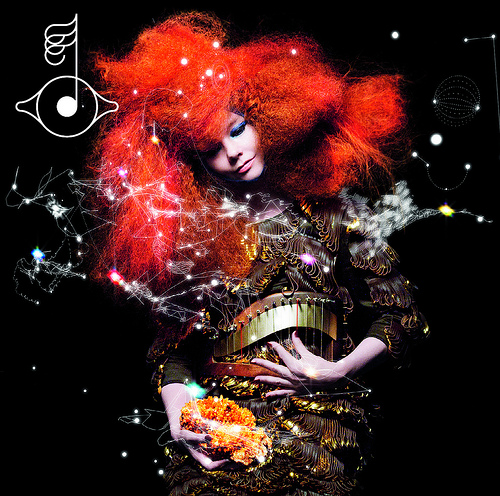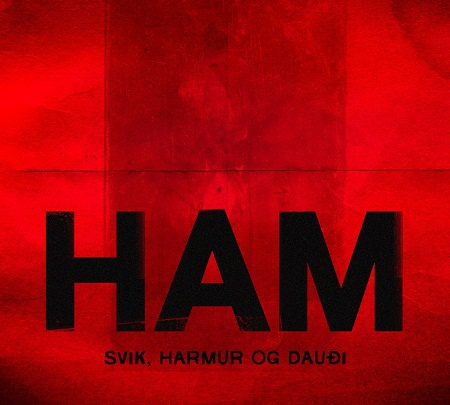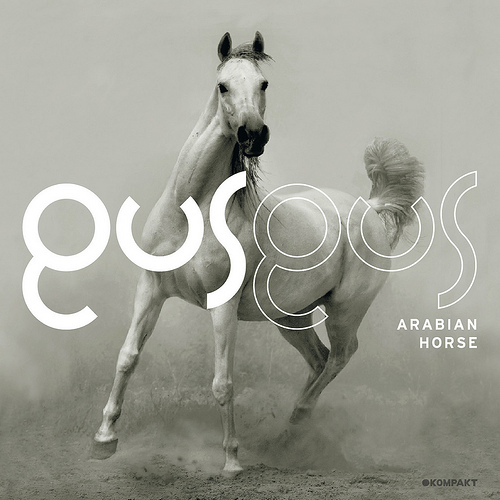Bored of year-end lists that usually don’t even manage to tell half the story, we decided to attempt a different approach at summing up 2011 in music.
Firstly, we got some of our most ardent music writers to pick just ONE Icelandic album from 2011 that they felt was somehow significant or meaningful and then write a short article about it; why they felt it mattered, why it is important. Do note that their instructions explicitly noted: “You don’t have to pick THE BEST album of 2011, just one you feel is particularly significant for some reason. You might even hate the album you’re writing about.”
Then, we called up a bunch of musicians we know and asked them to tell us about an album that played a big part in their year for whatever reason. We told them the albums didn’t need to have been released in 2011 or anything—just to name an album that was important to them, and tell us why.
You can read the results below.
THE WRITERS
BRIDGING THE GAP
Björk – Biophilia
By Bergrún Anna Hallsteinsdóttir
 In all honesty, I haven’t listened very consistently to ‘Biophilia,’ the latest piece of aural artwork by Björk. It is without a doubt a good album, but to me it has an intensity to it that means I have to be in a certain mood to hear it, and therefore it hasn’t been on high rotation in my music collection. In saying this, it may seem strange that I feel it has been one of the most important albums produced this year. Presumably, albums of importance are albums you listen to a lot. Albums that speak to you on a deeper level. Albums that move you. That kinda thing. ‘Biophilia’ does none of these things for me. However, ‘Biophilia’ is important on a different level. All music aside, and to make a rather grand statement, it is a watershed album of our time.
In all honesty, I haven’t listened very consistently to ‘Biophilia,’ the latest piece of aural artwork by Björk. It is without a doubt a good album, but to me it has an intensity to it that means I have to be in a certain mood to hear it, and therefore it hasn’t been on high rotation in my music collection. In saying this, it may seem strange that I feel it has been one of the most important albums produced this year. Presumably, albums of importance are albums you listen to a lot. Albums that speak to you on a deeper level. Albums that move you. That kinda thing. ‘Biophilia’ does none of these things for me. However, ‘Biophilia’ is important on a different level. All music aside, and to make a rather grand statement, it is a watershed album of our time.
For those not in the know, as well as being a standard CD release, Biophilia consists of a series of ten apps, all housed in one ‘main’ app, which correlate to the tracks of the album, giving listeners the opportunity to interact with, expand on and essentially ‘play’ with the album. It is not just an album, but an evolving creation, in a symbiotic relationship with its listeners. What Björk has created is not just the usual collection of tracks which form an album, it is a multimedia experience. While she may not be the first artist to create this kind of app-album combo, she is certainly the first to combine the mediums of art and science on this level.
Whilst I sing the praises of this techno-triumph, I must say that musically, I have mixed feelings about certain aspects of the digital age. It often seems like despite all of technology’s positive possibilities, we are heading down a path of technological gluttony, ignoring what is to be gained from the progress we’ve made in favour of instant gratification. Sometimes I miss the simple pleasure found in the rhythm of taking a vinyl LP out of its sleeve, putting it on the turntable and hearing its satisfying crackle and hiss as it begins to turn. Am bored by the… easiness of things? Sometimes.
However, with this album, I (gulp) put my prejudices aside. We live in an age of choice and opportunity, and with ‘Biophilia,’ Björk is embracing the positive possibilities of technology and offering up a whole new musical experience, in a sense getting us to interact with music again, but in a new way. The strands of this digital era that Björk grasps in her crafting of ‘Biophilia’—interaction, innovation, creativity (to name a few)—are things this generation can be grateful for and are therefore well worth employing in the creation of an album.
What appeals to me so much with ‘Biophilia’ is this interactive nature of it. It’s not just about plugging yourself in and sitting there zoned out, drooling slightly. There is something more to it.
A new path, a new direction. That alone, without any musical genius involved, is enough to make it an important album. But further to this, it is also one of those rare things which bridges the gap between different worlds, connecting science, art and technology in one fell swoop. And that is not to be sneezed at.
A VERY UNKOSHER COMEBACK
HAM get all significant on our grills in 2011
By Rebecca Louder
 I spent the better part of the autumn tits-deep in local music, sifting through the good, the bad and the barftastically ugly new albums on the market. But out of the many, many Icelandic records that were released this past year none have stood out as more distinctive and notable to me than that great old meaty band HAM’s ‘Svik, harmur og dauði.’ Let’s be honest, very few artists of any genre or status level can pull off even a half-decent comeback album after twenty years out of the studio, but HAM are not just any band.
I spent the better part of the autumn tits-deep in local music, sifting through the good, the bad and the barftastically ugly new albums on the market. But out of the many, many Icelandic records that were released this past year none have stood out as more distinctive and notable to me than that great old meaty band HAM’s ‘Svik, harmur og dauði.’ Let’s be honest, very few artists of any genre or status level can pull off even a half-decent comeback album after twenty years out of the studio, but HAM are not just any band.
I had never even heard of them before July, when word came to me from fellow writer Bob Cluness of their performance at the last Eistnaflug festival—a degenerate, debaucherous, giant den of iniquity presided over by Sigurjón Kjartansson’s doomy sermons and Óttar Proppé’s wretched, crackling voice. By the time their album was released at the end of August, their first full-length studio album in 22 years, this band’s historical mystique had been so strongly impressed on me that I was afraid it was all just a crack-up.
But holy shit. This music has its own aura. Having started out in the late ‘80s as a group of slapdash, underdog rockers, they were basically the most hated band in the country when they put out their first record. Reviled by critics and music-lovers alike, they pretty much went ahead without giving a shit and managed to put out an album which would enter the canon of local heavy music and put them as the musical centrepiece of one of Iceland’s most famous movies, ‘Sódóma Reykjavík.’ They went as quickly as they came though, leaving the faint smell of the smokehouse in the air and dangling threats of select reunion shows (which they made good on to open for Rammstein and such). They turned into some kind of fatty, crispy unicorn.
So it seemed like no one really believed this album would ever happen until it fucking happened. And once it did it sort of took over. The music perfectly recaptured their original sound combining grimy fun and sexy darkness with the added heaviness that comes with age, maturity and cynicism. They have two decades under their belts of wonderful and horrible life experiences (if the title suggests anything, more of the latter) and they translated it all into an enjoyable, relatable and memorable collection of fantastic rock songs.
Since its release, every show they’ve played has been packed, the airplay has been incredible and the response has been nothing short of unbridled enthusiasm. The generation they influenced on their first tour of duty were loyal and they pulled in an entirely new set of listeners with those just discovering them. And with some of the members dabbling about in municipal politics too, they are set to leave a lasting mark in more ways than one.
The meal will run out of meat eventually but grief, betrayal and death go on forever.
DRUNK ON
POSSIBILITY
GusGus – Arabian Horse
By Valgerður Þóroddsdóttir
 Everyone I talked to seemed to sense it. Seemed to feel the need to say it. It was not just that GusGus’ latest effort was more than great; it was that its exceptionality seemed to signal something. It suggested a blossoming. Heralded a musical ripening.
Everyone I talked to seemed to sense it. Seemed to feel the need to say it. It was not just that GusGus’ latest effort was more than great; it was that its exceptionality seemed to signal something. It suggested a blossoming. Heralded a musical ripening.
Indeed, with ‘Arabian Horse,’ GusGus has emerged from the crib of local infamy—from years’ worth of shape-shifting and incessant reinvention—as a fully-fledged sexual being. Having flirted with international recognition for over fifteen years—since their inception in 1995—GusGus released this year an album that may just succeed in seducing a foreign audience in a big way.
For when it comes to the music of GusGus, the requisite metaphor is always sex. And when it comes to talking about sex in 2011, we must pay homage, briefly, reluctantly, to the great metaphor that is the-year-2007.
It was the year of ‘Forever,’ GusGus’ first release in five years, one of their many rebirths. It was also, now infamously, the year of a certain teen-age for Iceland. Better said, it was the end of a phase—one I would liken to senior year in high school: a time when for unclear and possibly unmerited reasons, one is confident, contemptuous of authority, and bloated with a sense of ruling the school; all the while standing—unwittingly—at the precipice of the great existential anticlimax that is college.
In any case, as a self-assured 17/18-year-old in 2007, I was on the same page as Iceland. The world was my dancefloor; and ‘Forever’—straightforward, optimistic, and silky smooth—was for me that moment-in-time distilled; Forever sparkled like the champagne bottle of a reality that I swam in.
The ten songs on ‘Arabian Horse’ are likewise a distillation—this time of everything that has been great about GusGus over the past decade-and-a-half. ‘Arabian Horse’ is like the older, more mature brother to ‘Forever,’ although to some extent the album draws on elements from all of the band’s six previous full-lengths.
I remember the excitement surrounding the 2011 release: the band’s first to go Gold in Iceland. Loyal fans whispered words like ‘commercially viable’—not as a discredit to the album, but with a sigh of relief. The consensus being that all the experimenting had culminated—congealed the band’s strengths—into a transcendent effort. What followed was not only a sense of awe that they could just keep getting better with time but, more importantly, a sense that this album deserved to be courted by ears of the bigger world-stage.
‘Arabian Horse’ does nearly to perfection what GusGus as a band has always done, though somewhat less potently on previous releases. It bottles a moment-in-time. It harnesses a feeling. To me it is that feeling of controlled chaos that is dancing at a packed-like-a-can-of-sweaty-sardines club-of-a-certain-disposition in downtown Reykjavík after the fall of the empire. I’m talking about the hopeless familiarity of it all; of closing your eyes and pretending that your dirty laundry is not hanging out to dry right there above the bar for everyone to see; of imagining instead that you are in a bubble. Drunk on possibility. Yes! Floating on a stream of alcoholic carbonation. 17 again in spirit except this time with a little living under your belt. Fully fledged. Sleek as a stallion. Dancing to that perfectly simple beat, everything going terribly right. Acceptance. Surrender. Reykjavík.
RIPE MANGO MAN MAKES AN ALBUM
Snorri Helgason – ‘Winter Sun’
By Dr. Gunni
 Snorri Helgason’s second album, Winter Sun, is my favorite album of 2011. It isn’t necessarily THE BEST album of 2011—I mean, who am I to say what is BEST?—it is just the one that I liked most to put on my Winamp and listen to over and over again, especially right after I woke up (at between 5 and 6 am) and blast through my earphones as I sipped the first litre or so of black, black coffee (with G-milk). Previously the other albums that have served a similar purpose have been Elvis Costello’s ‘Armed Forces,’ The Stooges’ ‘Raw Power’ and ELO’s ‘Discovery.’
Snorri Helgason’s second album, Winter Sun, is my favorite album of 2011. It isn’t necessarily THE BEST album of 2011—I mean, who am I to say what is BEST?—it is just the one that I liked most to put on my Winamp and listen to over and over again, especially right after I woke up (at between 5 and 6 am) and blast through my earphones as I sipped the first litre or so of black, black coffee (with G-milk). Previously the other albums that have served a similar purpose have been Elvis Costello’s ‘Armed Forces,’ The Stooges’ ‘Raw Power’ and ELO’s ‘Discovery.’
But really, isn’t that what makes for a good album? Being able to listen to it over and over again without getting bored with it? And getting some kind of nice feeling out of the experience?
Snorri, if you recall, was the musical brain behind this Icelandic smart ass pop band, Sprengjuhöllin, who exploded in 2007 with their debut album and imploded in 2008 with their second, way-too-ambitious album. Snorri’s first solo album, the simple sounding ‘I’m Gonna Put My Name On Your Door’ (2009) was alright I guess, but the new one is just so much better. In my five star review for Fréttatíminn, I likened Snorri’s songwriting talents to him being perfectly ripe at that moment. I said something like: If Snorri was a mango he should be eaten right now. Yes, I have way too often likened the music listening experience to the eating experience.
Snorri is a music nerd. He even had a radio show presenting nerdy pop music history details before he moved to London to try to “make it.” He likes his ‘60s and ‘70s singer-songwriter stuff, and pop and rock and all that so you can hear traces of The Beatles, Beach Boys, Lovin’ Spoonfuls, Harry Nilsson et al in his songs. He plays the (accoustic) guitar and sings in a mellow laid back way. It’s never particularly retro, as Sindri Már Sigfússon (of Sin Fang and Seabear fame) produces the album and puts on a layer of modern indie sheen (not an overwhelmingly thick layer, though).
I deem ‘Winter Sun’ the feelgood album of the year. It’s so nice, warm and abundant in catchy melodies. The general feel of the album is bright and sunny. The songs are usually slow and laid back, not at all full of sorrow and pain. In step with his I-have-been-staying-in-a-mountain-hut beard, Snorri sings in a rather manly voice, and not with the boring indie whine that is way too common these days and must sicken everybody that is not a young idiot.
I think the good Icelandic music stuff will keep on pouring out in 2012, and I hope Snorri makes some new stuff and will still be ripe. Here are ten other very good Icelandic albums of 2011 in alphabetical order:
GusGus – ‘Arabian Horse’ *****
Ham – ‘Svik, harmur og dauði’ ****
Hellvar – ‘Stop That Noise’ ****
Hljómsveitin Ég – ‘Ímynd fíflsins’ ****
Lay Low – ‘Brostinn strengur’ *****
Mugison – ‘Haglél’ ****
Reykjavík! – ‘Locust Sounds’ ****
Saktmóðigur – ‘Guð hann myndi gráta’ ****
Song For Wendy – ‘Meeting Point’ ****
Sykur – ‘Mesópótamía’ ****
NEW RAVE RISING
Möller Record’s ‘Helga’ compilation showed an electronic scene in rude health
By Bob Cluness
 So in 2011, did you gaze on as Iceland’s culture industries became increasingly synergised and emboldened, pushing, promoting and hyping the Icelandic music “brand” to all who’d listen? And did you groan as the Icelandic music being championed increasingly resembled a homogenous lump, sounding like all the other dross out there, save for a big shiny “Made In Iceland!” sticker slapped on it (if it’s from Iceland, it must be better, right?)?
So in 2011, did you gaze on as Iceland’s culture industries became increasingly synergised and emboldened, pushing, promoting and hyping the Icelandic music “brand” to all who’d listen? And did you groan as the Icelandic music being championed increasingly resembled a homogenous lump, sounding like all the other dross out there, save for a big shiny “Made In Iceland!” sticker slapped on it (if it’s from Iceland, it must be better, right?)?
Well quit your fucking whining and stop being such a pussy. Despite the ever present alt-mainstream circle jerk, if you looked hard enough this year, there were people making all sorts of music, fun and noise, playing their own game, not a cutesy lopapeysa nor glacier in sight.
Nowhere was this more evident than with Iceland’s electronic music scene. After the relative dormancy of the last few years, which saw electronic artists band together in numerous collectives—much like settlers hunker down for the winter—2011 saw an upsurge in creative energy and activity from all involved.
Everywhere you looked there was something interesting going on. On the broadcasting front, the guys from drum & bass collective Breakbeat.is upped their game in seeking out and mainlining the best bass sounds around, their Saturday evening show on X-ið 97.7 becoming THE ONLY THING worth listening to on Icelandic radio. Meanwhile, the scene’s experimental faction saw much noise blasting frenzy, with some amazing shows as well as releases from the likes of AMFJ, Hljóðaklettar Records, and Reptilicus (their first in thirteen years).
But the scene’s big development in 2011 was the creation of electronic music label Möller Records. Birthed by Jóhann ‘Skurken’ Ómarsson and Árni ‘Futuregrapher’ Grétar, the label curated a brace of releases from artists such as Fu Kaisha, Murya, Prince Valíum and Steve Sampling, as well as Futuregrapher and Skurken themselves.
All this energy culminated at the end of the year with the release of the label’s first compilation, ‘Helga’. Originally compiled as a collection of tunes for Icelandair’s entertainment system, it was made freely available to the public as a digital download. And as a snapshot of where Icelandic electronic music is in 2011, you’d be hard pressed to find a clearer statement.
There’s very little slack or deadwood within the compilation. We’re treated to a variety of styles and beats that range from the sombre, new age influenced ambience of Prince Valium (’Efni’), to the skittering kinetic rhythms of Fu Kaisha (‘Porth’) and the FSOL influenced shuffle of Futuregrapher (‘Untitled Acid For Skurken’). What’s interesting though is that you’re listening to artists who look to be at a pivotal stage in the evolution of their craft.
Steve Sampling’s music is progressing nicely from hip hop into a meaty soundtrack-based garage/2-step sound, while Fu Kaisha’s tunes are ripe for a juke/footwork workout. But the real buzz is with HaZaR and his tightly wound bass manoeuvres in ‘Gullikal.’ Listening to this, as well as his other tracks on Soundcloud, it obvious we’re observing the creation of Iceland’s first true exponent of “wobble” bass music. Fun times.
So 2011 saw a re-awakening within the scene, but in reality it’s 2012 where the real fun/work begins. Out there in the big bad non-Icelandic world, electronic music is going through a period of change/mutation not seen since the heady days of hardcore rave and jungle. And while it’s great many local artists are uploading stuff onto Soundcloud and releasing material through Bandcamp, it’s only just the beginning.
The people of Iceland need to loosen their parochial shackles and start getting in on the act, infiltrating, listening, absorbing, reworking and bending those interesting new sounds to their will and throwing them right back out there. As for the artists, they need to harness the power and potential that rests within social media—reaching out to like-minded people, making friends, creating alliances, building their rep, etc. In other words, Icelandic electro artists need to hustle old-school style, to make themselves heard through the bitstorm.
With the looming prospect of cheap flights to and from Europe next year, along with our ever expanding digital climate, the age old orthodoxy/excuse that music and trends arrive in Iceland 3–5 years after everyone else is no longer valid. Man it’s gonna be a fun ride.
www.mollerecords.com
Further Listening:
AMFJ – ‘Bæn’
Reptilicus – ‘Initial Conditions’ 7”
Futuregrapher – ‘Tom Tom Bike’
Bix – ‘Animalog’
Buy subscriptions, t-shirts and more from our shop right here!















